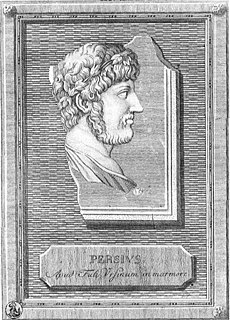A Quote by Aulus Persius Flaccus
Our life is our own to-day, to-morrow you will be dust, a shade, and a tale that is told. Live mindful of death; the hour flies.
Related Quotes
To-morrow, and to-morrow, and to-morrow, Creeps in this petty pace from day to day, To the last syllable of recorded time; And all our yesterdays have lighted fools The way to dusty death. Out, out, brief candle! Life's but a walking shadow, a poor player, That struts and frets his hour upon the stage, And then is heard no more. It is a tale Told by an idiot, full of sound and fury, Signifying nothing.
We have to trust the Lord God for so many things, and it is but one thing more to trust him in the issues of life and death, and to accept the fact that his plans and promises and purposes transcend the bounds of this world and of this life. With such faith the years are kind, and peace and reconciliation do come to those who have laid to rest their loved ones - who, even in death, are not far removed from us, and of whom our Father in heaven will be mindful until we meet again even as we are mindful of our own children.
Yes, this life is passing swiftly; our days
seem to fade quickly; and
death appears frightening at times.
Nevertheless, our spirit will continue
to live and will one day be united with
our resurrected body to receive immortal glory. I bear solemn witness
that because of the merciful Christ,
we will all live again and forever.
All our knowledge merely helps us to die a more painful death than the animals that know nothing. A day will come when science will turn upon its error and no longer hesitate to shorten our woes. A day will come when it will dare and act with certainty; when life, grown wiser, will depart silently at its hour, knowing that it has reached its term.
But how to know the falsity of death? How can we know there is no death? Until we know that, our fear of death will not go either. Until we know the falsity of death, our lives will remain false. As long as there is fear of death, there cannot be authentic life. As long as we tremble with the fear of death, we cannot summon the capacity to live our lives. One can live only when the shadow of death has disappeared forever. How can a frightened and trembling mind live? And when death seems to be approaching every second, how is it possible to live? How can we live?
Mindful consumption is the object of this precept. We are what we consume. If we look deeply into the items that we consume every day, we will come to know our own nature very well. We have to eat, drink, consume, but if we do it unmindfully, we may destroy our bodies and our consciousness, showing ingratitude toward our ancestors, our parents, and future generations.
... Providence conducts us with so much kindness through the different periods of our life, that we scarcely feel the change; our days glide gently and imperceptibly along, like the motion of the hour-hand, which we cannot discover. ... we advance gradually; we are the same to-day as yesterday, and to-morrow as to-day: thus we go on, without perceiving it, which is a miracle of the Providence I adore.
It is a common error, and the greater and more mischievous for being so common, to believe that repentance best becomes and most concerns dying men. Indeed, what is necessary every hour of our life is necessary in the hour of death too, and as long as one lives he will have need of repentance, and therefore it is necessary in the hour of death too; but he who hath constantly exercised himself in it in his health and vigor, will do it with less pain in his sickness and weakness; and he who hath practiced it all his life, will do it with more ease and less perplexity in the hour of his death.
By 'coming to terms with life' I mean: the reality of death has become a definite part of my life; my life has, so to speak, been extended by death, by my looking death in the eye and accepting it, by accepting destruction as part of life and no longer wasting my energies on fear of death or the refusal to acknowledge its inevitability. It sounds paradoxical: by excluding death from our life we cannot live a full life, and by admitting death into our life we enlarge and enrich it.
In our own storms in life the Savior is our solace and our sanctuary. If we seek peace, we must come unto Him, the Man who suffered for mankind, who committed His life to healing the sick and comforting the disconsolate, is mindful of your sufferings, doubts, and heartaches. Living the gospel does not mean the storms of life will pass us by, but we will be better prepared to face them with serenity and peace.






































